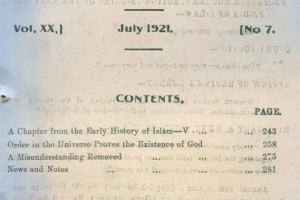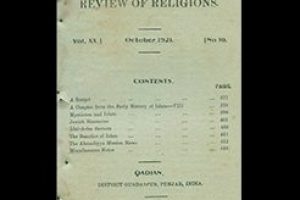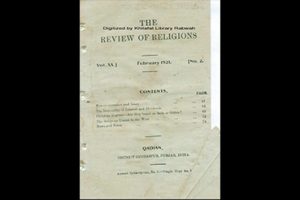
Anas Mahmood, Professor Amtul Razzaq Carmichael
A Chapter from the Early History of Islam, III
Causes of Dissension Among the Early Muslims
The April 1921 edition of the Review of Religions was full of scholarly and faith-inspiring articles. The first article of the April issue was the translation of an address given by His Holiness, Hazrat Mirza Bashir-ud-Din Mahmud Ahmad (ra), second Successor of the Promised Messiah (as), to the Martin Historical Society at the Islamia College Hall Lahore on 26th February 1919. It was an extremely significant lecture because it dealt with a particularly important era in the history of Islam. This address eloquently explained the causes of conflict and dissension amongst early Muslims. Hazrat Mirza Bashir-ud-Din Mahmud Ahmad (ra), provided a correct and accurate historical account of the conflicts which arose amongst early Muslims after the demise of the Holy Prophet (sa). Hazrat Mirza Bashir-ud-Din Mahmud Ahmad (ra) refuted various allegations levelled against the person of Hazrat ‘Uthman (ra) and his companions. Some historians have claimed that conflicts of early Islam were the results of an alleged incompetence of Hazrat ‘Uthman (ra), while others have claimed this to have been the result of a bitter power struggle between various companions of the Holy Prophet (sa). In this lecture, His Holiness (ra) countered both these notions with clear evidence and clarified that conflicts arose due to the conspiracies of the enemies of Islam. This lecture is now available in a book form. [1]
Dr Henry Strubbe on the Justice of the Mohammadan Wars
The second article in this issue of the Review of Religions is entitled ‘Dr Henry Strubbe on the justice of the Mohammadan Wars’. In this article, the author robustly responds to the allegations of the critics of Islam regarding its apparently violent history. The author mentions two orientalists, Mr Herbert Quick and Dr Henry Strubbe. The former is prejudiced against Islam and has made vile comments regarding its teachings. The latter however is considered amongst the ‘more sober and impartial critics who write honestly and in good faith’. Their expressions, nonetheless, are affected by their mindset by the efforts of Christian missionaries.
The author explained in response to the allegation of bloodshed in the early years of Islam, that Muslims were only permitted to take the sword in self-defence in response to increasing bitter and violent persecution by their opponents. The Qur’anic commandments about this is clear as stated in Chapter, verse 40, which states: ‘Permission to fight is given to those against whom war is made, because they have been wronged — and Allah indeed has power to help them —’.
The author categorically rejected the allegations as put forward by Dr Strubbe’s that ‘Muhammad propagated his religion by the sword’ and sought to ‘extirpate’ Christianity and all other religions of the world. To answer this, the author gave the beautiful example of the Holy Prophet (sa) how he peacefully spread the message of the Unity of God. Citing examples of Hyrancus, who was behind the forced conversion of Idumeans (Edomites) to Judaism and some Christian practices of forced conversions, the author presented the practice of the Holy Prophet (sa), who gave the letters of security and protection to the Jews and Christians of Arabia.
The actions and character of Hazrat Umar bin Al-Khattab (ra) are also defended, as the reason behind his expatriation of the Jews of Arabia is described as an act of ‘civil prudence than religion’. Jews were never compelled to accept Islam and were never expelled from any of the other Muslim lands. Upon the conquest of Jerusalem, Hazrat Umar (ra) guaranteed the safety and security of Christians.
How to Obtain Peace of Mind

This short article offers excellent value, particularly today, when mental health issues are on the rise due to the Covid-19 pandemic. The protective practice of social distancing and being away from loved ones has taken its toll on the resilience and mental health of the public.
The author gave the example of a person, who feels secure in a pandemic ravaged area because he believes that the disease cannot be passed from a person to person; while another person feels secures only because he has been properly vaccinated and takes appropriate precautions. The sense of security of the first person is delusional and is true for the second person as it is based on logic and reasoning. The author clarified that peace of mind is freedom from cares and protection from the dangers of ruin. Those who have acquired the state of a peaceful mind, see no need to boast about this.

No human being on earth is immune from facing hardship; the nature and intensity of the hardship may be different, but no one can experience life without facing some physical, emotional, or mental challenges. So how can one attain peace of mind when facing real struggles and challenges of life? The author explained a fundamental philosophy; a hardship which is considered to be a stepping stone to further progress does not disturb our peace of mind. People, who are driven and aim for a high goal are not daunted by the obstacles that come in their way. They use their intellect to overcome the challenges and succeed. This means that a pain or grief, which we believe, will finally result in something good for us, will not destroy our peace, rather it will strengthen it. The hardship and difficulties of life do not affect man if he knows they are good for him ultimately. Human beings only are troubled by those problems which they consider would be the cause of their destruction. A problem perceived as ruinous causes one to lose one’s peace of mind.

The author explained that Godly and God-Fearing people are always happy at heart despite facing severe hardships and apparently insurmountable difficulties. Not only do their faces show signs of happiness, but their hearts are full of bliss and certainty. This bliss is not the result of ignorance, for they have found God. The God who they now know is the fountainhead of all blessings, who controls every atom of the Universe, and who possesses the power to remove all troubles. True believers do not look at God from a distance, rather they have found a way whereby to attain His pleasure and attract His love. Nothing overawes them or disturbs their peace of mind. They know that He controls the Universe and that He loves them and to God they entrust everything. So, the afflictions they are subjected to are not meant to bring about their destruction, for who can suffer to see his beloved perish? The strength of their faith in God comes to their help when their own power of resistance fails. God sends them help and vouchsafes to them His protection. And to those upon whom He chooses to send down continuous calamities, He vouchsafes certainty and knowledge that strengthens their faith. Those, who are the closest to God, suffer the harshest of calamities. The reason behind their greater share of pain is so that God may show the strength of their character to the world, and so the world may be overawed at the power of God. Such people seem to suffer on the outside, but their hearts are full of peace and tranquillity. Such people’s pain is taken away from them in extraordinary ways, and they make astounding progress.
The only way to gain peace of mind is to attain union with that Great Being, Who is the Creator and Controller of all those causes which bring about pain and suffering. The changes in the universe are too numerous for even the greatest scientist to understand, let alone control. Wealth cannot give us peace of mind, nor honour, skill, power, or knowledge; all these things are limited and each one of these brings a new trial and its train.

So, the question remains, how do we attain this degree of faith in the existence of God that ensures inner peace? The author declares that the only door open for this is to believe in and faithfully adhere to the Islam taught by Hazrat Mirza Ghulam Ahmad (as) of Qadian. As the Messiah of this day and age, he offers reasoning, logic, fact, and objectivity to the seeker of truth. While assessing the truthfulness of God by following the teachings of Islam, it is helpful to keep company with Godly people. This will help remove any doubts and then the faith will be based on facts and reason, rather than mere supposition. Thus, man can attain true peace of mind by connecting with God.
Prophecies That All Men Must Know
In the next article, Muhammad Dilawar Khan BA described some Islamic prophecies. The author explained that one of his acquaintances was astonished to learn that the author was not deeply aggrieved about the breakup of the Ottoman Empire; the author says that the partitioning of Turkey was an event prophesied, that was bound to happen. The author has recognised Hazrat Mirza Ghulam Ahmad (as) of Qadian as the Promised Messiah and Mahdi. The Promised Messiah (as) did, in fact, warn the Sultan of Turkey and other Emperors and counselled them against taking part in the war, as wars were forbidden at the time of the Promised Messiah (as). Sadly, the Turkish ruler ignored this advice and met the end as prophesied. Then the author mentioned various prophecies made by the Holy Prophet (sa), in which the destruction of the latter days is prophesied. These prophecies show that the glory of Turkey would see an end. Afterwards, a list of faith-inspiring prophecies set out by the Holy Qur’an is given, which includes the creation of zoos, democracy, factories, canals etc and we see these prophecies fulfilled today everywhere.
Sayings of the Prophet (sa)
In the section, numerous sayings of the Holy Prophet (sa) are mentioned. One of which describes seven different types of people being granted the shade of Allah the Exalted:
- A just king
- One who has devoted himself from his youth.
- The one whose heart is fixed on the mosque.
- Two friends, whose friendship is for the sake of God, or are separating from each other for His pleasure.
- A man who remembers God when he is alone, and weeps.
- The one who fears Allah when tempted by a rich and beautiful woman.
- The one who gives in charity in secret, so that his left hand is unaware of what his right hand has given.
In this section, many faith-inspiring sayings of the Holy Prophet (sa) are explained relating to almost every aspect of human life such as interactions with each other, animal rights and personal purification.
News and Notes
In the section of News and Notes, the first piece is about Hazrat Dr Mufti Muhammad Sadiq (ra), whose frequent debates with Christians left them dumbfounded. He would debate on the issue of the death of Jesus (as), the magnanimity of the Holy Prophet (sa) when he allowed the Christians to pray at his mosque in Medina, and how that compared to their attitude; ‘The Christian Ministers avowed that to give their church to a Muslim to lecture was nothing less than to give their fortress to the Germans’.
Another section is regarding the mission of the Jama’at in London. The author commended the missionaries who have ventured far from home to preach their religion in a foreign land. A new Darut-Tabligh (House of Preaching) has been established, the opening ceremony of which was attended by numerous people. The next piece is from West Africa and is entitled ‘Cheering News’. Mr Nayyar has been successful in gaining 4000 converts after preaching Islam in Sierra Leone.
Revived After Three Days’ Supposed Death
The final article is regarding the story of a girl from Pengam, a colliery town between Monmouth and Glamorgan Wales, who was mistakenly considered to be dead, and her burial arrangements were made, and she was laid out as dead. On the third day, when the coffin arrived and her relatives went to her room, they were surprised to hear the girl wake up and asking about where her dad was? Her dad hurriedly carried her to her another bedroom, so that she would not realise that she has been laid for dead. The author relates this case to the crucifixion of Jesus (as). In the case of the girl, no intelligent man will consider that she had died and then come back to life. Rather the logical explanation is that those who had taken her for dead were mistaken. Why then is the same not thought of Jesus (as)? Why is he considered to have come back to life after death, when that is completely illogical?
Professor Amtul Razzaq Carmichael MD, M Ed, FRCS (Gen Surg.), MBBS, is a consultant. She qualified in 1987 with gold medals for academic Excellence and undertook her surgical training at major teaching hospitals in London, Edinburgh and Philadelphia. She has authored many articles for major peer-reviewed scientific journals. She is a senior member of The Review of Religions Editorial Board as well as Assistant Manager.
ENDNOTES




Add Comment